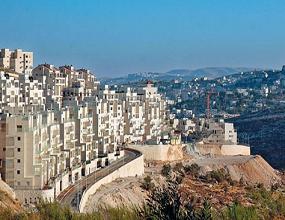|
World Jewish News

Jerusalem's Har Homa neighborhood in 2008. Photo by Emil Salman(Haaretz.com)
|
Jerusalem master plan: Expansion of Jewish enclaves across the city
28.06.2010, Israel The Jerusalem District Planning and Building Committee is set to approve an unprecedented master plan that calls for the expansion of Jewish neighborhoods in East Jerusalem, a move largely based on construction on privately owned Arab property.
The committee's proposal would codify the municipality's planning policy for the entire city. In essence, Jerusalem would uniformly apply its zoning and construction procedures to both halves of the city.
Before giving the go-ahead, the committee will give objectors to the plan 60 days to submit their reservations. This is the decisive stage in the planning process, because only rarely are plans altered.
Once the 60-day period expires, the plan's approval is a fait accompli. Such a development would probably invite a hail of criticism from the Palestinians, Arab countries and the international community.
The United States has recently communicated its expectation that Prime Minister Benjamin Netanyahu will prevent any change in the city's status quo pending the conclusion of final-status talks with the Palestinian Authority. Netanyahu is scheduled to meet with U.S. President Barack Obama in Washington early next month.
For over a decade, dozens of architects have worked to draw up the latest Jerusalem master plan, meant to replace the one in effect since 1959, eight years before the Six-Day War. While the plan did not attract opposition from the international community and leftist organizations, political developments over the last year - including the spat with the United States over the Ramat Shlomo building project - are likely to touch off renewed diplomatic tensions.
According to a document prepared by Ir Amim, an NGO that "seeks to render Jerusalem a more viable and equitable city," the master plan vastly underestimates the construction needs of the Arab population in the city. While the plan calls for 13,500 new residential units in East Jerusalem for Palestinians, updated demographic studies indicate that this amount barely represents half the minimum needs for the Arab population by 2030.
Ir Amim officials also said that while the plan allows for Palestinian construction in the north and south of the capital, it barely provides for an expansion of Arab construction projects in the center of the city, particularly in the area next to the holy basin.
The group added that the plan creates a spate of bureaucratic obstacles for Palestinians who wish to build in the city. Ir Amim warns that the plan is likely to be perceived as an Israeli provocation because most of the Jewish building projects are designated for areas east of the Green Line.
In October 2008, the district committee opted to promote a master plan submitted by Moshe Cohen, formerly the chief Jerusalem planner at the Interior Ministry. Right-wing political parties in Jerusalem protested to Interior Minister Eli Yishai over the plan's intention to add significantly larger residential areas for the benefit of the Arab population at the expense of green areas.
Jerusalem Mayor Nir Barkat instructed his subordinates to alter the plan in line with his policy of thickening the Jewish presence around the holy basin and the eastern half of the city.
Despite the National Planning and Building Committee's decision to designate the City of David - which sits in the heart of the East Jerusalem neighborhood of Silwan - as "a national park," the new master plan allows for the construction of residential units in the area.
The Ir David Foundation, a nonprofit group that seeks to increase Jewish settlement in the City of David and whose heads are close associates of the mayor, has in recent years bought houses near the Old City in an effort to "Judaize" the area.
Last week, the Jerusalem municipality's planning and building committee approved a controversial plan for the Silwan neighborhood that calls for razing 22 Palestinian homes built without permits and constructing a tourism center in their place. Barkat said the illegal construction in the area is preventing the municipality from building a tourism center, which would include restaurants and boutique hotels.
Earlier this year planning officials received an internal memo circulated by Cohen, who was later dismissed as head of the master plan staff. Cohen wrote that the plans for the City of David are an example "of the district committee's ambitious intention to satisfy contradictory positions." He warned that this would not pass legal muster.
Cohen objected to the city's decision to convert 2,500 dunams that were listed as "open areas" into residential neighborhoods.
A Jerusalem municipality spokesman said in response: "Indeed, the plan will be brought for a discussion before the district committee." A spokesman from Yishai's office said: "Professional deliberations are taking place in an effort to approve the plan."
By Akiva Eldar and Nir Hasson
Haaretz.com
|
|
